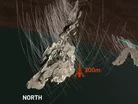BHP invests $50 million in Kabanga Nickel and Lifezone

BHP has bought an 8.9% equity stake in Kabanga Nickel - worth $40 million - and made a $10 million investment in Lifezone to advance the roll-out of its patented hydrometallurgical technologies.
The capital will be used to accelerate the development of the Kabanga Nickel Project in Tanzania - billed as the world’s largest development-ready nickel sulphide deposit.
Lifezone - which currently has patents granted in over 150 countries - will build and operate a refinery in Tanzania. Site and infrastructure development are already underway and studies are expected to be completed by the end of 2022.
Lifezone hydromet is seen as the future of sustainable metals processing as it is more cost-efficient than smelting and provides significantly lower environmental impact.
The deal means finished Class 1 battery grade nickel, copper and cobalt will be produced in the east Africa country.
Chris Showalter, Kabanga Nickel CEO, said the partnership highlights the "world class nature" of the Kabanga deposit and its importance in helping meet decarbonisation challenges.
"BHP’s investment reflects the project’s strong ESG credentials and its role in improving environmental performance throughout the nickel value chain," he said.
"Through development of Kabanga and Lifezone hydromet, Tanzania will have a growing role in the supply of the battery metals needed to move to a global low carbon economy."
Future investment tranches in Kabanga Nickel have been agreed subject to certain conditions, including a second tranche of US$50m and the right for BHP to make further investments.
Once invested and on conversion the second tranche of US$50 million will increase BHP’s equity stake in Kabanga Nickel to 17.8% (15% see-through interest in Tembo Nickel Corporation), thereby valuing the project at US$658 million post-money.
The investment will also support hiring and training of local Tanzanian talent.
The current project development timeline anticipates first production in 2025. Output will ramp up to target a minimum annual production of 40,000 tonnes of nickel, 6,000 tonnes of copper and 3,000 tonnes of cobalt.
The Honourable Doto Biteko, Minister of Minerals, said Tanzania has a vision to become an important hub for critical decarbonisation minerals.
"We now stand ready to help the world in the production and refining of the crucial metals that society needs, while creating skilled jobs and benefiting the economy of our country."



